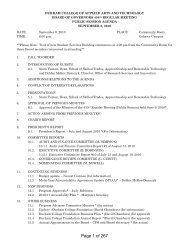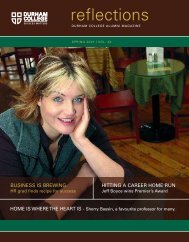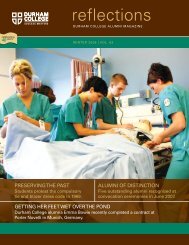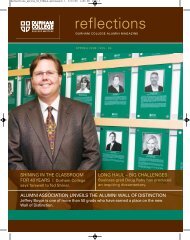Fall 2006 - Durham College
Fall 2006 - Durham College
Fall 2006 - Durham College
You also want an ePaper? Increase the reach of your titles
YUMPU automatically turns print PDFs into web optimized ePapers that Google loves.
TAKING HUMOUR SERIOUSLY<br />
A CERTIFIED LAUGHTER LEADER, MICHAEL KERR INSPIRES PEOPLE TO SEARCH DEEP WITHIN THEMSELVES<br />
AND FIND A REASON TO LAUGH.<br />
by SARA BECKFORD<br />
Laughter guru Michael Kerr believes<br />
there are two personality types in the<br />
world: Those who wake up to the “Rocky”<br />
theme, dance their way to the shower<br />
where they perform a concert for soap<br />
and shampoo, race around the house to<br />
dry off, run to work and smile at everyone<br />
they see. The second type is not as<br />
enthusiastic. These people hit the snooze<br />
button 10 times before they roll out of bed<br />
only to stumble into the bathroom to give<br />
themselves a hasty sponge bath. Zombielike,<br />
they continue to the kitchen, where<br />
they insert their daily caffeine IV drip then<br />
slump over the steering wheel as they<br />
proceed to work, where they likely arrive<br />
five or 10 minutes late.<br />
It may be hard to believe, but the<br />
personality type you fall under is<br />
completely within your control. One<br />
main difference between the two types<br />
is perspective. An optimist is more<br />
likely to fall under the first type than a<br />
pessimist. This means it’s not the boss<br />
who is constantly breathing down your<br />
neck, the kids running around the house<br />
screaming, or the uncooperative weather<br />
that creates a bad mood. It’s our attitudes<br />
about them.<br />
“We’re stressed because we don’t laugh<br />
enough,” says Kerr. “In fact, adults today<br />
laugh one third less than they did during<br />
the 1950s. And while the average small<br />
child laughs over 400 times per day,<br />
adults laugh only about 15.”<br />
Kerr is a certified laughter leader. He<br />
has written four books, and speaks at<br />
numerous seminars encouraging people<br />
to look at the world around them and find<br />
a reason to laugh. Last fall he brought his<br />
workshop to campus.<br />
Laughter is the best medicine. Kerr says<br />
when we laugh we take in more oxygen,<br />
increasing our blood circulation up to 35<br />
per cent. This increase not only lowers<br />
blood pressure, but also increases our<br />
red blood cell activity. And that boosts<br />
our immune system, helping us fight off<br />
diseases and illnesses like respiratory<br />
infections. Kerr points out that laughing<br />
also gives you a facial massage. This<br />
is important because the face is the<br />
first area that shows stress. Laughter<br />
massages our internal organs and this<br />
helps our bodies digest food quicker.<br />
Doctors have determined that a good<br />
solid laugh lasting 20 to 30 seconds<br />
has the same benefits as a three-minute<br />
workout on a rowing machine.<br />
The importance of humour runs very<br />
deep. The benefits from laughing can not<br />
only prevent you from getting sick – they<br />
can even protect you from death. The<br />
Canadian Mental Health Association says<br />
that 70 to 80 per cent of our illnesses<br />
are caused by stress. And the American<br />
Health Association has estimated that 52<br />
per cent of business people will die from<br />
work-related stress.<br />
“The sense of humour is the most<br />
undervalued, underappreciated resource<br />
we have at our disposal,” says Kerr.<br />
“It’s important that you live every day like<br />
it’s your last, because one day you will<br />
be right.”<br />
Kerr says it’s important to take fun<br />
seriously. Your sense of humour is much<br />
more than telling jokes. Instead, it is<br />
finding humour in your day-to-day life.<br />
By looking at the world around you from<br />
a new angle, you will be able to create<br />
humour and avert stress. You don’t have<br />
to be a comedian to do it. Instead of<br />
yelling at your son for leaving his shoes<br />
on the kitchen counter, turn it into a<br />
comment about Nikes being on tonight’s<br />
dinner menu. If you see a sign that says,<br />
“Ears pierced while you wait,” ask<br />
yourself what the alternative is. You can<br />
also read package labels, and find<br />
questionable warnings: A shower cap that<br />
says, “Fits one head only,” or a package of<br />
peanuts with the warning, “Caution, may<br />
contain traces of nuts.”<br />
If, at first, you don’t think something<br />
is funny enough to laugh at – fake it. It’s<br />
almost as good as the real thing. You<br />
still receive many of the same benefits<br />
as a hearty laugh, and it just might help<br />
lighten up your mood. After all, as Kerr<br />
says, “Tragedy plus time will one day<br />
equal comedy.”<br />
WWW.DURHAMCOLLEGE.CA REFLECTIONS | FALL <strong>2006</strong> 19











![Annual Report 2007 – 2008 [PDF - 942 KB] - Durham College](https://img.yumpu.com/46399542/1/190x245/annual-report-2007-2008-pdf-942-kb-durham-college.jpg?quality=85)





